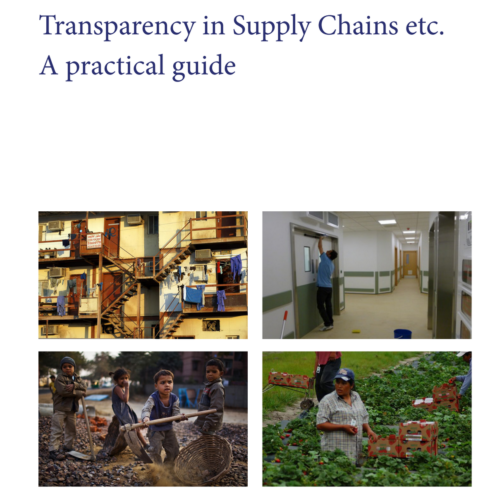-
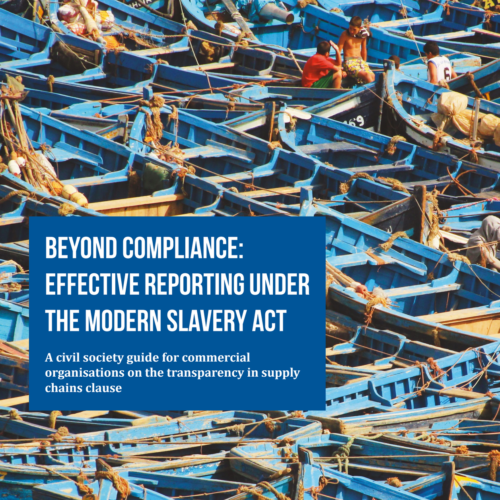 CORE is a civil society coalition on corporate accountability. This is a guide for commercial organisations on Section 54 of the Modern Slavery Act 2015, “Transparency in Supply Chains”. It is intended as a guide to understanding and addressing risks of modern slavery in supply chains, and provides guidance on producing, publishing and reviewing the annual slavery and human trafficking statement required of businesses.
CORE is a civil society coalition on corporate accountability. This is a guide for commercial organisations on Section 54 of the Modern Slavery Act 2015, “Transparency in Supply Chains”. It is intended as a guide to understanding and addressing risks of modern slavery in supply chains, and provides guidance on producing, publishing and reviewing the annual slavery and human trafficking statement required of businesses. -
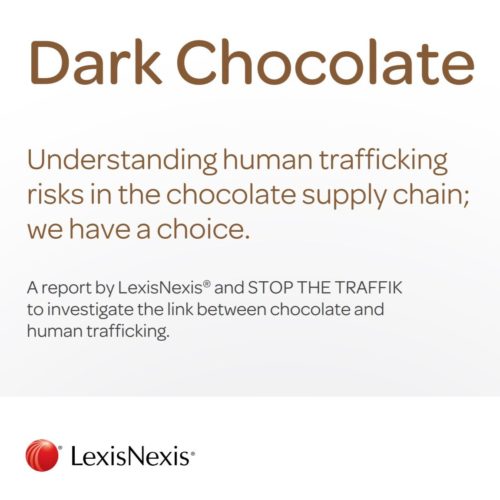 LexisNexis and STOP THE TRAFFIK produced this report after an investigation into the link between chocolate and human trafficking. The report is aimed at consumers seeking to better understand the products they consume, those working with suppliers and NGOs seeking to understand how media cover societal issues.
LexisNexis and STOP THE TRAFFIK produced this report after an investigation into the link between chocolate and human trafficking. The report is aimed at consumers seeking to better understand the products they consume, those working with suppliers and NGOs seeking to understand how media cover societal issues.Credit: Lexis Nexis and Stop the Traffik
-
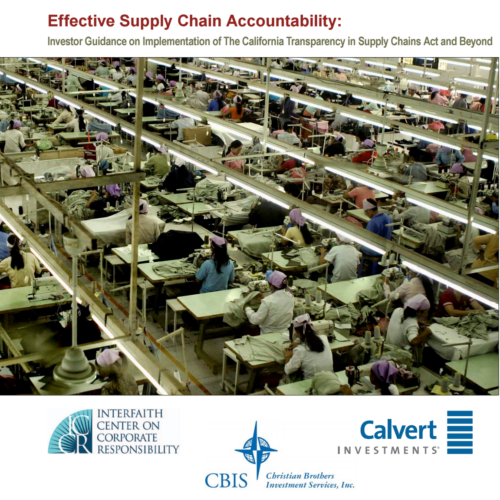 This guidance for investors outlines key steps relating to a company’s development of a specific anti-trafficking program, including elements the company should include in reports to demonstrate to stakeholders and shareholders that they are evaluating key risks in the supply chain and taking appropriate steps to address them. These include: - Develop and implement a human rights policy - Establish a human rights due diligence process - Conduct human rights risk assessments - Review, develop, and implement auditing, verification and traceability mechanisms - Train staff, suppliers, vendors, contractors, and auditors - Collaborate to expand efforts and influence - Produce a robust and substantive annual report
This guidance for investors outlines key steps relating to a company’s development of a specific anti-trafficking program, including elements the company should include in reports to demonstrate to stakeholders and shareholders that they are evaluating key risks in the supply chain and taking appropriate steps to address them. These include: - Develop and implement a human rights policy - Establish a human rights due diligence process - Conduct human rights risk assessments - Review, develop, and implement auditing, verification and traceability mechanisms - Train staff, suppliers, vendors, contractors, and auditors - Collaborate to expand efforts and influence - Produce a robust and substantive annual reportCredit: Interfaith Centre on Corporate Responsibility; Christian Brothers Investment Services; Calvert Investments.
-
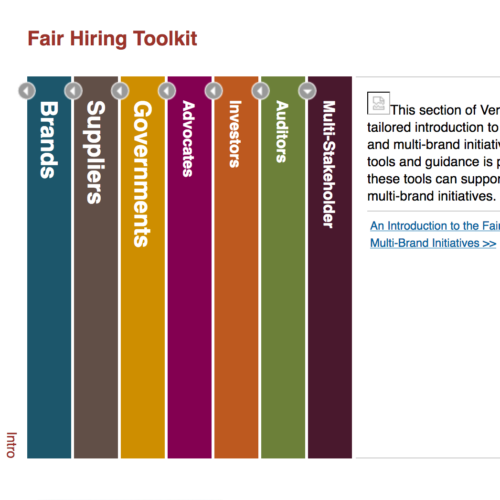 The Fair Hiring Toolkit is a resource which addresses fair hiring practice and responsible recruitment of migrant workers in global supply chains. It focuses on all levels of an organisation to tailor tools and advice appropriately and is a step-by-step process of how to implement trafficking-free supply chains. This includes providing a Framework for Action for brands and suppliers, and supplying guidance for governments, advocates, investors, auditors and other stakeholders. The Frameworks offer advice on: - Improving Codes of Conduct - Raising awareness and building capacity - Strengthening assessments and social audits - Taking corrective action & developing systems improvement plans - Reporting and transparency - Engagement with other actors - Public policy
The Fair Hiring Toolkit is a resource which addresses fair hiring practice and responsible recruitment of migrant workers in global supply chains. It focuses on all levels of an organisation to tailor tools and advice appropriately and is a step-by-step process of how to implement trafficking-free supply chains. This includes providing a Framework for Action for brands and suppliers, and supplying guidance for governments, advocates, investors, auditors and other stakeholders. The Frameworks offer advice on: - Improving Codes of Conduct - Raising awareness and building capacity - Strengthening assessments and social audits - Taking corrective action & developing systems improvement plans - Reporting and transparency - Engagement with other actors - Public policyCredit: Verite
-
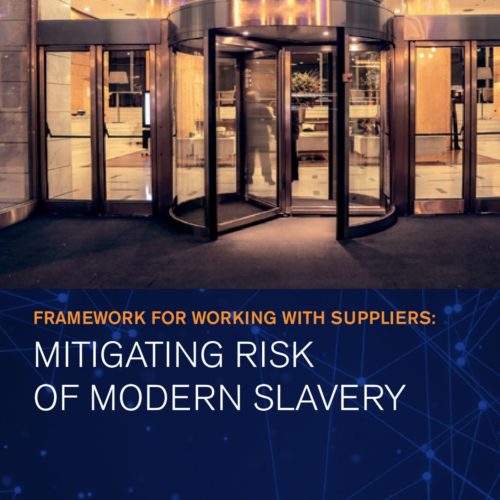 The Framework for Working with Suppliers: Mitigating Risk of Modern Slavery is a tool intended to be used by stakeholders at various levels of management within the hotel industry. It recommends specific responsibilities for brands, hotel owners and management companies, based on best practice and the experience and input of the Stop Slavery Hotel Industry Network (the "Network") membership. The Network brings together representatives from across the hotel industry to combat human trafficking and modern slavery within the sector. Its ethos stems from the acknowledgement that actors across the industry, whether international brands, bespoke hotel groups, independent owners, managers or employee agencies are all responsible for combating this horrific crime.
The Framework for Working with Suppliers: Mitigating Risk of Modern Slavery is a tool intended to be used by stakeholders at various levels of management within the hotel industry. It recommends specific responsibilities for brands, hotel owners and management companies, based on best practice and the experience and input of the Stop Slavery Hotel Industry Network (the "Network") membership. The Network brings together representatives from across the hotel industry to combat human trafficking and modern slavery within the sector. Its ethos stems from the acknowledgement that actors across the industry, whether international brands, bespoke hotel groups, independent owners, managers or employee agencies are all responsible for combating this horrific crime.Credit: Stop Slavery Hotel Industry Network
-
 Hedging Risk by Combating Human Trafficking: Insights from the Private Sector is designed to help companies share best practices so they can mitigate their risks and help eliminate this heinous practice. In this first of a series, we highlight insights and technology-driven interventions in the hospitality, finance, and transportation industries.
Hedging Risk by Combating Human Trafficking: Insights from the Private Sector is designed to help companies share best practices so they can mitigate their risks and help eliminate this heinous practice. In this first of a series, we highlight insights and technology-driven interventions in the hospitality, finance, and transportation industries.Credit: World Economic Forum
-
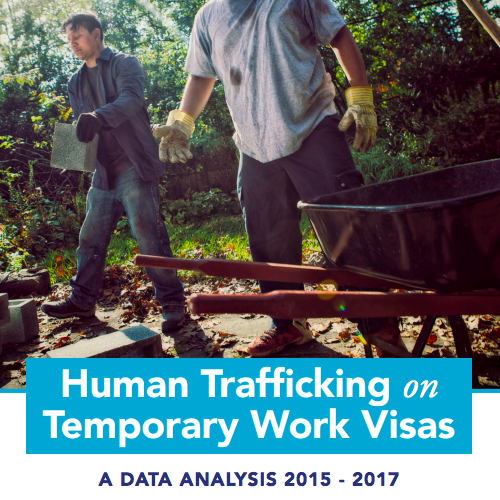 This report highlights the destructive practice of labour trafficking on temporary work visas, how the system is flawed, and the steps needed to fix it. From 2015-2017, Polaris collected data on the US temporary work visa system and identified some 800 victims of human trafficking who held temporary work visas at the time of their abuse.
This report highlights the destructive practice of labour trafficking on temporary work visas, how the system is flawed, and the steps needed to fix it. From 2015-2017, Polaris collected data on the US temporary work visa system and identified some 800 victims of human trafficking who held temporary work visas at the time of their abuse.Credit: Polaris
-
 Stronger Together is a multi-stakeholder initiative which aims to reduce modern slavery. It provides guidance, training and resources to organisations, employers, labour providers, workers and their representatives. This free collection of resources includes pragmatic guidance and toolkits, and resources for the workplace including multilingual posters, leaflets and template policies. This template is to be modified as required and for inclusion with a wider Tackling Modern Slavery in Business and Supply Chain or Business Human Rights Policy.
Stronger Together is a multi-stakeholder initiative which aims to reduce modern slavery. It provides guidance, training and resources to organisations, employers, labour providers, workers and their representatives. This free collection of resources includes pragmatic guidance and toolkits, and resources for the workplace including multilingual posters, leaflets and template policies. This template is to be modified as required and for inclusion with a wider Tackling Modern Slavery in Business and Supply Chain or Business Human Rights Policy.Credit: Stronger Together
-
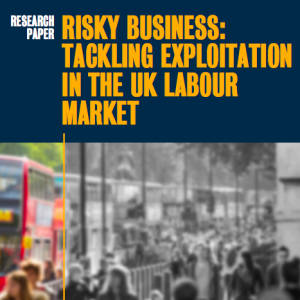 This report provides a comprehensive guide to an effective response to human trafficking for labour exploitation in the UK. It identifies the picture of risk to individuals of exploitation in the UK labour market, then presents solutions to such exploitation through: labour inspection and enforcement; gateways to advice and remedy; and corporate accountability.
This report provides a comprehensive guide to an effective response to human trafficking for labour exploitation in the UK. It identifies the picture of risk to individuals of exploitation in the UK labour market, then presents solutions to such exploitation through: labour inspection and enforcement; gateways to advice and remedy; and corporate accountability.Credit: Focus on Labour Exploitation (FLEX)
-
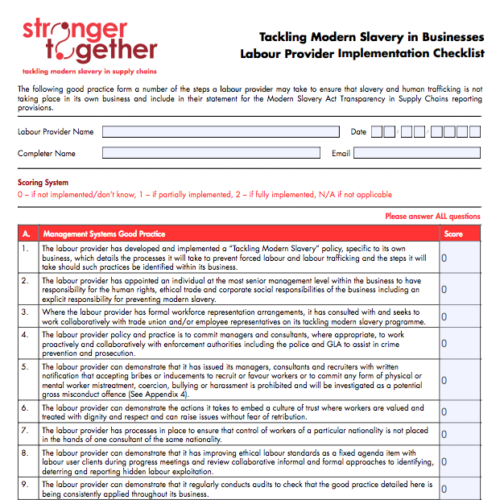 Stronger Together is a multi-stakeholder initiative which aims to reduce modern slavery. It provides guidance, training and resources to organisations, employers, labour providers, workers and their representatives. This free collection of resources includes pragmatic guidance and toolkits, and resources for the workplace including multilingual posters, leaflets and template policies. This is a good practice checklist that can be used by labour providers to ensure modern slavery and human trafficking is not happening in any area of their own business, and to include in their statement for the Modern Slavery Act Transparency in Supply Chains reporting provisions. It splits up the checklist into: management systems, training to build capacity and capability, labour sourcing, recruitment processes, worker records analysis to alert risks, worker allocation, workplace monitoring, worker engagement, providing access to remedy.
Stronger Together is a multi-stakeholder initiative which aims to reduce modern slavery. It provides guidance, training and resources to organisations, employers, labour providers, workers and their representatives. This free collection of resources includes pragmatic guidance and toolkits, and resources for the workplace including multilingual posters, leaflets and template policies. This is a good practice checklist that can be used by labour providers to ensure modern slavery and human trafficking is not happening in any area of their own business, and to include in their statement for the Modern Slavery Act Transparency in Supply Chains reporting provisions. It splits up the checklist into: management systems, training to build capacity and capability, labour sourcing, recruitment processes, worker records analysis to alert risks, worker allocation, workplace monitoring, worker engagement, providing access to remedy.Credit: Stronger Together
-
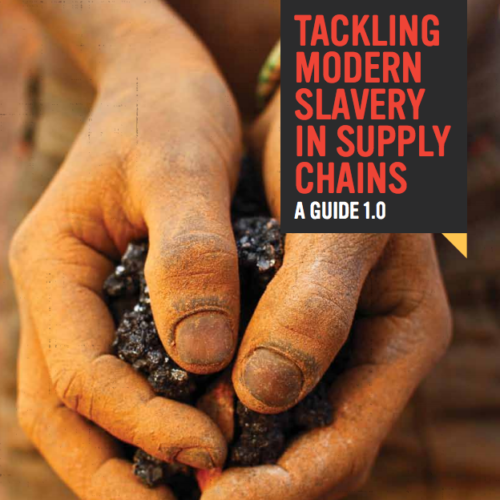 The Walk Free Foundation was established by Andrew Forrest, the Chairman of Fortescue Metals Group, after he found labour exploitation within his own supply chains and took a number of steps to prevent modern slavery affecting his business. This comprehensive guide considers corporate policy on modern slavery and provides both guidance and tools to implement it. It includes advice on corporate policy and provides template examples of a number of tools.
The Walk Free Foundation was established by Andrew Forrest, the Chairman of Fortescue Metals Group, after he found labour exploitation within his own supply chains and took a number of steps to prevent modern slavery affecting his business. This comprehensive guide considers corporate policy on modern slavery and provides both guidance and tools to implement it. It includes advice on corporate policy and provides template examples of a number of tools.Credit: Walk Free Foundation and Verite
-
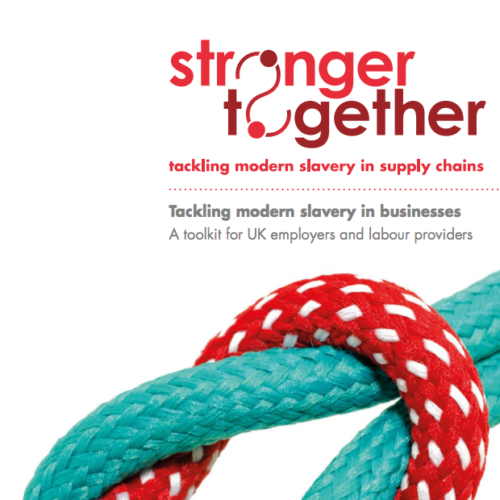 Stronger Together is a multi-stakeholder initiative which aims to reduce modern slavery. It provides guidance, training and resources to organisations, employers, labour providers, workers and their representatives. This free collection of resources includes pragmatic guidance and toolkits, and resources for the workplace including multilingual posters, leaflets and template policies. This 12 point checklist lists actions for both employers and labour providers such as corporate policy improvement, workplace awareness-raising initiatives and steps to ensure supply chain transparency.
Stronger Together is a multi-stakeholder initiative which aims to reduce modern slavery. It provides guidance, training and resources to organisations, employers, labour providers, workers and their representatives. This free collection of resources includes pragmatic guidance and toolkits, and resources for the workplace including multilingual posters, leaflets and template policies. This 12 point checklist lists actions for both employers and labour providers such as corporate policy improvement, workplace awareness-raising initiatives and steps to ensure supply chain transparency.Credit: Stronger Together

